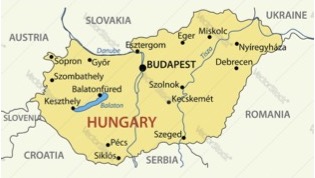BUDAPEST: Hungary is a maze of contradictions. When Russia invaded Ukraine in February the populist Orban government agreed to the first round of EU/US sanctions punishing Moscow for aggression.
But Prime Minister Viktor Orban opposes cutting oil and gas imports from Russia, saying that would cause severe domestic hardship. Arguing that ending the war must be the priority, Orban refuses to allow armaments destined for Ukraine to transit Hungary.

Hungary has permitted Ukrainian refugees to pass through its 135-mile border with Ukraine and up to 300 000 have done so. Most have moved on, but many ethnic Hungarians who fled homes in Ukraine are there. Hungary is not a Slavic land and Ukrainians find the Magyar language exceedingly difficult. Budapest is 230 miles from the Ukrainian border.
Eight years ago, while Germany took in one million refugees mostly from the war in Syria, Hungary pointedly refused to resettle any, calling them Islamic invaders, a threat to Christian civilization.
On 3 April Orban’s Fidesz party won a landslide victory in a parliamentary election. With his fourth consecutive electoral win, Orban’s increased margin of victory stunned analysts who projected a closer outcome. It was a complete shock, said one. Fidesz boosted its two-thirds majority in parliament, winning 53% of the vote against 35% for the combined opposition. Seventy percent of Hungary’s eight million voters cast ballots.
Sujit Chaudhuri, a political analyst and management professor in Budapest, says Orban won because Hungarians seek continuity and stability. The opposition—despite professing unity—is fragmented, unified only in opposing the 58-year-old Orban.

Viktor Orban sprang to prominence as a brave youthful revolutionist fighting Hungary’s communist dictatorship. But since becoming prime minister for the second time in 2010 he has restricted the judiciary and independent media. A skilled politician, before the April election he increased old-age pensions, boosted family allowances and froze fuel prices. Critics here and abroad cried foul, but the measures resonated in Orban’s electoral heartland outside the capital.
Hungarian-Ukrainian relations are strained, a principal reason being the status of ethnic Hungarians in Ukraine. Before World War One, part of western Ukraine was Hungary. Kyiv’s recurrent efforts to restrict the Russian language adversely impacts the use of Hungarian. Orban stoutly defends the many ethnic Hungarians living outside Hungary. He does not get along with Volodymyr Zelensky, but has cordial relations with Vladimir Putin, who quickly congratulated Orban on his electoral triumph.
Like other central European lands, Hungary joined Nato in 1999 and the European Union in 2004. Orban is a renegade in both, judging the EU as dominated by France and Germany. He made common cause with Poland’s right-wing populists, but that alliance is coming undone because of Polish fury over Orban’s refusal to support Ukraine.
Orban proudly calls himself an illiberal democrat. He rails against globalization and western elites. He has cultivated strong ties with China as well as Russia. China’s belt and road initiative is building a high-speed rail line south from Budapest to Serbia and Greece. Telecommunications giant Huawei, sanctioned by the US, maintains a research centre in Hungary.
Hungary, like its neighbours, finds its economy battered by the war in Ukraine. Inflation is at a 15-year high, joblessness is rising and growth slowing. Hungary’s currency is 30% weaker than four years earlier.
Analysts are unsure of Orban’s agenda for the years ahead. Some fear further constitutional change and drift towards dictatorship. Orban, opponents argue, is facilitating Russian and Chinese attempts to divide Europe. Nonsense, say Orban supporters, he is guilty of nothing more than asserting Hungarian identity in a culturally diverse Europe.
Barry D. Wood is a frequent visitor to Hungary and for three years in the 1990s was based in Prague, reporting on the economic transformation in post-communist Europe.
* This article has been edited to reflect a change in the reference to the status of western Ukraine prior to the First World War.
The views of the author are not necessarily those of the Daily Friend or the IRR.

